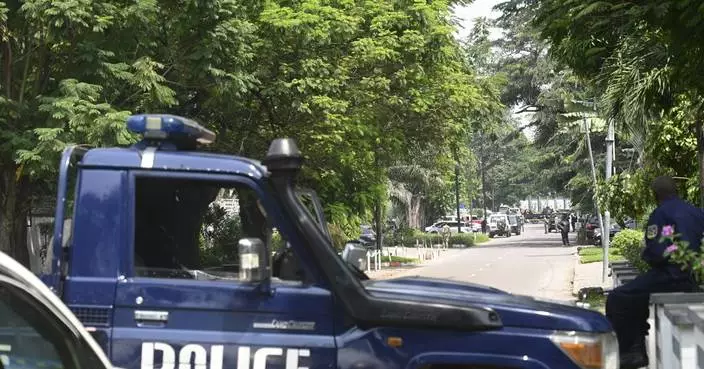SUNRISE, Fla. (AP) — Before the final minutes even ticked off the clock at Amerant Bank Arena on Monday night, Florida Panthers fans — clad in red jerseys and waving light-up rally towels in the air — were singing goodbye to the Tampa Bay Lightning.
Tampa Bay's season ended there, in a 6-1 loss to Florida in the first round of the NHL playoffs. And the Panthers will march on after beating their in-state rivals in a playoff series for the first time in four tries.
The Panthers won four of five games in the series thanks to stellar play on the penalty kill and some clutch performances from goalie Sergei Bobrovsky and their other stars. They'll face either the Boston Bruins or Toronto Maple Leafs in the second round. The Bruins lead their first-round series 3-1 with Game 5 in Boston on Tuesday.
“Really happy for the players who went through the pain of not having success,” Panthers coach Paul Maurice said. “(Aleksander) Barkov and Bobrovksy, when you're a leader, when you're the No. 1 goaltender and the captain, and you have a series that doesn't go your way, those are the guys to look at. They have to answer for it.”
Both players answered in the first round this year after being part of Panthers teams that lost 4-2 to Tampa Bay in 2021 and were swept in 2022. Barkov scored both of his opening-round goals in Game 5. Bobrovsky had a .896 save percentage. And Carter Verhaeghe scored five goals as they all hope to carry the Panthers into the next round.
“Every series is different and this group of guys is special and works so hard,” Bobrovsky said. “We have a great structure and everybody executed and worked hard for it. We're really close.”
Even after what many Panthers players described as a hard-fought, emotional series in Round 1, they believe that they have the group to avoid a drop off.
“We're gonna be playing probably our next biggest rival, so there will be no emotional letdown," Florida forward Matthew Tkachuk said. “Whoever we play, it's going to be another very intense, another fun series to be a part of.”
The Panthers overcame a 3-1 series deficit against the Bruins in the first round of last year’s playoffs, defeating Boston 4-3 in overtime of Game 7 to eliminate a dominant Bruins team that had set a regular-season record with 63 wins. Florida then beat the Maple Leafs in five games in the next round.
Florida was winless against the Bruins in the regular season, going 0-2-2 with three of those losses coming by one goal. Barkov and Sam Reinhard each had two goals and two assists in those games. Tkachuk had a goal and an assist.
The Panthers split the regular-season series with the Maple Leafs, with Reinhard notching four goals and an assist.
Florida's penalty kill, which was nearly perfect against the Lightning's power play that led the league during the season, could be one of its biggest advantages moving forward. The Panthers killed off 16 of 18 Tampa Bay power plays, staying aggressive and keeping the Lightning out of the offensive zone.
“That was my favorite part: When the pressure was the most extreme, the guys made plays. They stepped up and made some plays," Maurice said. "That takes some courage.”
AP NHL playoffs: https://apnews.com/hub/stanley-cup and https://www.apnews.com/hub/NHL

Florida Panthers goaltender Sergei Bobrovsky deflects a shot during the first period of Game 5 of the first-round of an NHL Stanley Cup Playoff series against the Tampa Bay Lightning, Monday, April 29, 2024, in Sunrise, Fla. (AP Photo/Wilfredo Lee)

Florida Panthers players celebrate after they beat the Tampa Bay Lightning 6-1, during Game 5 of the first-round of an NHL Stanley Cup Playoff series, Monday, April 29, 2024, in Sunrise, Fla. (AP Photo/Wilfredo Lee)

Florida Panthers defenseman Oliver Ekman-Larsson (91) left wing Matthew Tkachuk (19) and center Aleksander Barkov, right, celebrate after Barkov scored during the third period of Game 5 of the first-round of an NHL Stanley Cup Playoff series against the Tampa Bay Lightning, Monday, April 29, 2024, in Sunrise, Fla. (AP Photo/Wilfredo Lee)

Florida Panthers center Aleksander Barkov (16) and left wing Matthew Tkachuk, left, congratulate center Carter Verhaeghe (23) after Verhaeghe scored a goal during the third period of Game 5 of the first-round of an NHL Stanley Cup Playoff series against the Tampa Bay Lightning, Monday, April 29, 2024, in Sunrise, Fla. (AP Photo/Wilfredo Lee)
WASHINGTON (AP) — Cyberattacks against water utilities across the country are becoming more frequent and more severe, the Environmental Protection Agency warned Monday as it issued an enforcement alert urging water systems to take immediate actions to protect the nation's drinking water.
About 70% of utilities inspected by federal officials over the last year violated standards meant to prevent breaches or other intrusions, the agency said. Officials urged even small water systems to improve protections against hacks. Recent cyberattacks by groups affiliated with Russia and Iran have targeted smaller communities.
Some water systems are falling short in basic ways, the alert said, including failure to change default passwords or cut off system access to former employees. Because water utilities often rely on computer software to operate treatment plants and distribution systems, protecting information technology and process controls is crucial, the EPA said. Possible impacts of cyberattacks include interruptions to water treatment and storage; damage to pumps and valves; and alteration of chemical levels to hazardous amounts, the agency said.
“In many cases, systems are not doing what they are supposed to be doing, which is to have completed a risk assessment of their vulnerabilities that includes cybersecurity and to make sure that plan is available and informing the way they do business,” said EPA Deputy Administrator Janet McCabe.
Attempts by private groups or individuals to get into a water provider’s network and take down or deface websites aren’t new. More recently, however, attackers haven’t just gone after websites, they’ve targeted utilities’ operations instead.
Recent attacks are not just by private entities. Some recent hacks of water utilities are linked to geopolitical rivals, and could lead to the disruption of the supply of safe water to homes and businesses.
McCabe named China, Russia and Iran as the countries that are “actively seeking the capability to disable U.S. critical infrastructure, including water and wastewater.”
Late last year, an Iranian-linked group called “Cyber Av3ngers” targeted multiple organizations including a small Pennsylvania town's water provider, forcing it to switch from a remote pump to manual operations. They were going after an Israeli-made device used by the utility in the wake of Israel's war against Hamas.
Earlier this year, a Russian-linked “hacktivist” tried to disrupt operations at several Texas utilities.
A cyber group linked to China and known as Volt Typhoon has compromised information technology of multiple critical infrastructure systems, including drinking water, in the United States and its territories, U.S. officials said. Cybersecurity experts believe the China-aligned group is positioning itself for potential cyberattacks in the event of armed conflict or rising geopolitical tensions.
“By working behind the scenes with these hacktivist groups, now these (nation states) have plausible deniability and they can let these groups carry out destructive attacks. And that to me is a game-changer,” said Dawn Cappelli, a cybersecurity expert with the industrial cybersecurity firm Dragos Inc.
The world’s cyberpowers are believed to have been infiltrating rivals’ critical infrastructure for years planting malware that could be triggered to disrupt basic services.
The enforcement alert is meant to emphasize the seriousness of cyberthreats and inform utilities the EPA will continue its inspections and pursue civil or criminal penalties if they find serious problems.
“We want to make sure that we get the word out to people that ‘Hey, we are finding a lot of problems here,’” McCabe said.
EPA did not say how many cyber incidents have occurred in recent years, and the number of attacks known to be successful so far is few. The agency has issued nearly 100 enforcement actions since 2020 regarding risk assessments and emergency response, but said that’s a small snapshot of the threats water systems face.
Preventing attacks against water providers is part of the Biden administration's broader effort to combat threats against critical infrastructure. In February, President Joe Biden signed an executive order to protect U.S. ports. Health care systems have been attacked. The White House has pushed electric utilities to increase their defenses, too. EPA Administrator Michael Regan and White House National Security Advisor Jake Sullivan have asked states to come up with a plan to combat cyberattacks on drinking water systems.
"Drinking water and wastewater systems are an attractive target for cyberattacks because they are a lifeline critical infrastructure sector but often lack the resources and technical capacity to adopt rigorous cybersecurity practices,'' Regan and Sullivan wrote in a March 18 letter to all 50 U.S. governors.
Some of the fixes are straightforward, McCabe said. Water providers, for example, shouldn't use default passwords. They need to develop a risk assessment plan that addresses cybersecurity and set up backup systems. The EPA says they will train water utilities that need help for free. Larger utilities usually have more resources and the expertise to defend against attacks.
“In an ideal world ... we would like everybody to have a baseline level of cybersecurity and be able to confirm that they have that,” said Alan Roberson, executive director of the Association of State Drinking Water Administrators. “But that's a long ways away.”
Some barriers are foundational. The water sector is highly fragmented. There are roughly 50,000 community water providers, most of which serve small towns. Modest staffing and anemic budgets in many places make it hard enough to maintain the basics — providing clean water and keeping up with the latest regulations.
“Certainly, cybersecurity is part of that, but that's never been their primary expertise. So, now you're asking a water utility to develop this whole new sort of department" to handle cyberthreats, said Amy Hardberger, a water expert at Texas Tech University.
The EPA has faced setbacks. States periodically review the performance of water providers. In March 2023, the EPA instructed states to add cybersecurity evaluations to those reviews. If they found problems, the state was supposed to force improvements.
But Missouri, Arkansas and Iowa, joined by the American Water Works Association and another water industry group, challenged the instructions in court on the grounds that EPA didn’t have the authority under the Safe Drinking Water Act. After a court setback, the EPA withdrew its requirements but urged states to take voluntary actions anyway.
The Safe Drinking Water Act requires certain water providers to develop plans for some threats and certify they’ve done so. But its power is limited.
“There's just no authority for (cybersecurity) in the law,” Roberson said.
Kevin Morley, manager of federal relations with the American Water Works Association, said some water utilities have components that are connected to the internet — a common, but significant vulnerability. Overhauling those systems can be a significant and costly job. And without substantial federal funding, water systems struggle to find resources.
The industry group has published guidance for utilities and advocates for establishing a new organization of cybersecurity and water experts that would develop new policies and enforce them, in partnership with the EPA.
“Let's bring everybody along in a reasonable manner,” Morley said, adding that small and large utilities have different needs and resources.
Phillis reported from St. Louis.
The Associated Press receives support from the Walton Family Foundation for coverage of water and environmental policy. The AP is solely responsible for all content. For all of AP’s environmental coverage, visit https://apnews.com/hub/climate-and-environment

FILE - This is a portion of the Municipal Water Authority of Aliquippa, Pa., shown on Dec. 11, 2023, in Aliquippa, Pa. Cyberattacks against water utilities across the country are becoming more frequent and more severe, the Environmental Protection Agency warned Monday, May 20, 2024, as it issued an enforcement alert urging water systems to take immediate actions to protect the nation's drinking water from electronic threats. (AP Photo/Gene J Puskar, File)

FILE - This photo provided by the Municipal Water Authority of Aliquippa shows the screen of a Unitronics device that was hacked in Aliquippa, Pa., Saturday, Nov. 25, 2023. Cyberattacks against water utilities across the country are becoming more frequent and more severe, the Environmental Protection Agency warned Monday, May 20, 2024, as it issued an enforcement alert urging water systems to take immediate actions to protect the nation's drinking water from electronic threats. (Municipal Water Authority of Aliquippa via AP, File)















